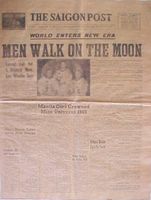I think God spoke to me yesterday. Calm down. It wasn't in the Biblical sense. It was more like, "You are about to die. Slow down, fool."
I'm traveling northbound on I-77. I'm maybe twenty miles north of Charleston, WV and ten miles south of Ripley. I had been driving through a heavy snow shower for over an hour. The pavement was by now wet; the atmospheric temperature somewhere around 25, with a rather stiff wind to add to the mix. It was shaping up to be a really crappy journey.
I'm doing about 75 miles per hour.
Now I know what you're thinking. You're shouting at your monitor, "You blamed fool! You're driving in blizzard conditions and you're doing 75?" Yes (says your monitor back to you). And I was talking on my cellphone (I know; I know). But before you think I'm a complete idiot, undertand that I have spent my life driving in all sorts of weather conditions, including winter weather much worse than this.
Okay. Maybe I was still an idiot. But I was carefully watching the pavement conditions as I sped recklessly northbound and I felt safe enough to proceed at breakneck speed.
Until I came over a rise and saw flashing hazard lights in the median ahead. That was an indication that something was not right. Sure enough, as I approached, I noticed a nice black Ford pickup truck up against the guardrail on the southbound side (with his flashers going). He had lost control as he passed over an ice-covered overpass and put his full-size pickup into the median.
My foot came off the gas.
Just as I was coming up to the scene of the accident, my attention turned to a full-size car (I don't know what make or model; it happened too quickly) lose control on the same overpass, spin out, and slam into the pickup. Mud, sod, and debris flew across the median and into the northbound lanes. The car's grill and what must have been part of the front bumper went bounding across the road in front of me and I slammed on the brakes. I dodged the debris but my car was showered with gravel, dirt, and who knows what-all.
I told the person I was talking to I'd have to call them back (and I may have shouted some expletive; I don't remember).
It was at this point that my years of driving experience paid off. Instinct told me that maybe I should slow down.
And to call 911.
Southbound lanes of the interstate were coming to a halt at the scene of the accident and travelers were getting out of their vehicles to assist the drivers (and passengers?). I thought of doing the same but I was on the wrong side of the highway and thought it best - rather than cause another accident - to move on.
So I called 911, gave the dispatcher a brief explanation for my call and told her where the accident had occurred. She asked if the vehicles involved were in the road and I told her that they were in the median but there was debris in the road - at least on the northbound side. As we talked, she was relaying the information to county units for their response. She thanked me for calling and I drove on - a bit more slowly.
By the time I was six or seven miles further up the road, I passed two sheriff's deputies' cars and two ambulances heading toward the accident. I hope the people involved were okay.
Yesterday I was lucky. I made it home at the end of the day. What to take from all this? Something Ralph Waldo Emerson wrote comes to mind. It seems appropriate.
O friend, never strike sail to a fear! Come into
port greatly, or sail with God the seas.
Essays, 1841
I'll be back at it again on Monday.
This comes to mind as well.
Slow down and pay attention to what you're doing, you idiot!
And get off the phone!
Paula, Friday, February 18, 2005






